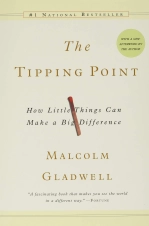The Tipping Point
A book review.

The Tipping Point
How Little Things Can Make a Big Difference
by Malcolm Gladwell
published: 2002
ISBN: 0316346624
genre: Social Science
reviewed:2010.06.11
👍🏼 recommended
This fascinating book is a dense telling of several ideas that explain how some ideas and things become wildly successful and others do not. The author threads together a number of concepts in a series of chapters that could easily serve as standalone articles on their discrete subjects. Whether it's "Hush Puppies" or Sesame Street or the famous ride of Paul Revere, Gladwell uses case after case to compile ideas and explanations for how we humans work.
The chapter titles are:
1. The Three Rules of Epidemics
2. The Law of the Few: Connectors, Mavens, and Salesmen
3. The Stickiness Factor: Sesame Street, Blue's Clues, and the Educational Virus.
4. The Power of Context (Part One): Bernie Goetz and the Rise and Fall of New York City Crime.
5. The Power of Context (Part Two): The Magic Number One Hundred Fifty
6. Case Study: Rumors, Sneakers, and the Power of Translation
7. Case Study: Suicide, Smoking, and the Search for the Unsticky Cigarette
You'll note that this reads like an academic treatise and that's what it really is. The author has clearly put an incredible amount of work into book. And by work, I mean speaking to people from disparate backgrounds and times and places. I mean in-depth interviews. I mean linking observations from very different people. As an example of the latter in the chapter on the Dunbar number (The Magic Number One Hundred Fifty) he draws together comments from a member of a Hutterite colony with comments from someone who works at the company that makes Gore-Tex.
But it's the ideas that matter, not the book, and thankfully this book delivers ideas in spades. I think many people realize that only a small number of people are needed to make a great impact, or that "stickiness" only happens when the right connection is made, or that the environment shapes how things play out. But this book shows how those things actually work - how does something become sticky; how does context impact people's psychology. And it's here that the author is so compelling. In the telling of the shooting by four young Black men in the New York subway system by Bernie Goetz, the author draws a link to the poor surrounds. That subway system had not only become a lawless mess but was so obviously run down and rife with fare avoidance that of course Goetz was in a bad state of mind. In the case of Revere, the author points out that there were actually two men riding that night, in different directions. Revere earned fame because he roused a militia to fight off the British. The other man, forgotten by history, didn't have the rare qualities that Gladwell attributes to Revere: he was both someone who constantly made a lot of connections, and he was also a gifted salesman. The other fellow? Just a regular person who set off to talk to people he didn't know and without any insight as to how to rouse them.
It really is a remarkable read.